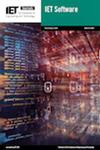差分数据解释器
IF 1.3
4区 计算机科学
Q3 COMPUTER SCIENCE, SOFTWARE ENGINEERING
引用次数: 0
摘要
数据记录引擎的核心推理任务是物质化,即对数据库上的数据记录程序进行评估,并将其物理地合并到数据库本身中。事实上的计算方法是通过递归应用推理规则。由于这是一个昂贵的操作,数据引擎必须提供增量物质化;也就是说,调整计算以适应新的数据,而不是从头开始。其中一个主要的注意事项是,删除数据比添加数据要复杂得多,因为必须考虑要删除的数据所包含的所有可能的数据。差分数据流是一种计算模型,它提供了高效的增量维护,在添加和删除之间具有相同的性能,以及迭代数据流的工作分布。在本文中,我们使用三个参考数据实现来研究物化的性能,其中一个是建立在轻量级关系引擎之上的,另外两个是具有相同优化的相同重写算法的差分数据流和非差分版本。实验结果表明,单调聚集比仅仅提升幂集晶格更有效。本文章由计算机程序翻译,如有差异,请以英文原文为准。
A Differential Datalog Interpreter
The core reasoning task for datalog engines is materialization, the evaluation of a datalog program over a database alongside its physical incorporation into the database itself. The de-facto method of computing is through the recursive application of inference rules. Due to it being a costly operation, it is a must for datalog engines to provide incremental materialization; that is, to adjust the computation to new data instead of restarting from scratch. One of the major caveats is that deleting data is notoriously more involved than adding since one has to take into account all possible data that has been entailed from what is being deleted. Differential dataflow is a computational model that provides efficient incremental maintenance, notoriously with equal performance between additions and deletions, and work distribution of iterative dataflows. In this paper, we investigate the performance of materialization with three reference datalog implementations, out of which one is built on top of a lightweight relational engine, and the two others are differential-dataflow and non-differential versions of the same rewrite algorithm with the same optimizations. Experimental results suggest that monotonic aggregation is more powerful than ascenting merely the powerset lattice.
求助全文
通过发布文献求助,成功后即可免费获取论文全文。
去求助
来源期刊

IET Software
工程技术-计算机:软件工程
CiteScore
4.20
自引率
0.00%
发文量
27
审稿时长
9 months
期刊介绍:
IET Software publishes papers on all aspects of the software lifecycle, including design, development, implementation and maintenance. The focus of the journal is on the methods used to develop and maintain software, and their practical application.
Authors are especially encouraged to submit papers on the following topics, although papers on all aspects of software engineering are welcome:
Software and systems requirements engineering
Formal methods, design methods, practice and experience
Software architecture, aspect and object orientation, reuse and re-engineering
Testing, verification and validation techniques
Software dependability and measurement
Human systems engineering and human-computer interaction
Knowledge engineering; expert and knowledge-based systems, intelligent agents
Information systems engineering
Application of software engineering in industry and commerce
Software engineering technology transfer
Management of software development
Theoretical aspects of software development
Machine learning
Big data and big code
Cloud computing
Current Special Issue. Call for papers:
Knowledge Discovery for Software Development - https://digital-library.theiet.org/files/IET_SEN_CFP_KDSD.pdf
Big Data Analytics for Sustainable Software Development - https://digital-library.theiet.org/files/IET_SEN_CFP_BDASSD.pdf
 求助内容:
求助内容: 应助结果提醒方式:
应助结果提醒方式:


